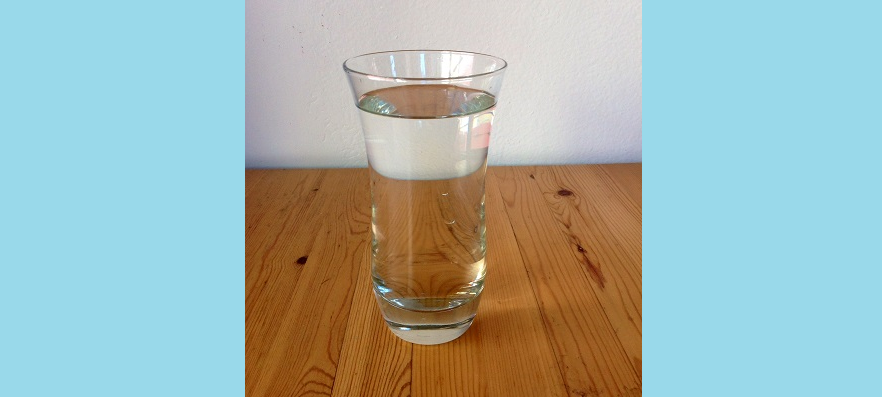
There’s a lot of talk about water lately, especially in California. It’s really a big problem, the lakes and reservoirs which feed our state with water are drying up and the Governor has imposed a mandatory 25% reduction in water use. It’s enough to make anyone feel thirsty. With all this talk of the water crisis, I thought I’d talk a little about dehydration in the body this week.
Bags of Mostly Water
As you’ve probably heard, the human body is mostly water. In fact, an adult human is roughly 65% water. Our blood is 92% water, our brain and muscles are 75% water, and even our bones are 22% water. Water is extremely important to us; we can live for a couple weeks without food, but only about three days without water. Every cell of our bodies needs water, which means that at any moment, there are 70 trillion cells in need of water in an adult human of average weight.
Functions of Water in the Body
As the most essential component of the body, water does a lot of things; in our blood and intestines, it helps transport nutrients. Water helps us eliminate waste, both through urination as well as through blood and intestines again. Water plays a huge role in sweating, which is the primary way we regulate our body temperature. It’s also very important in lubricating our joints and connective tissues. Water is everywhere within us and is a part of almost every process.
Dehydration Explained
Dehydration occurs when we use or lose more fluid than we take in, and our bodies don’t have enough water and other fluids to carry out their normal functions. If we don’t replace lost fluids, we will become dehydrated.
Dehydration is commonly caused by vigorous exercise, especially in hot weather, intense diarrhea, vomiting, fever or excessive sweating. Not drinking enough water during exercise or in hot weather even if you’re not exercising can also cause dehydration. Anyone can become dehydrated, but young children, older adults and people with chronic illnesses are at a higher risk.
Symptoms of Dehydration
- Thirst
- Muscle Fatigue
- Loss of coordination
- Dry, sticky mouth
- Inability to regulate temperature
- Reduced urination
- Dry skin – if the skin has lost its stretchiness, that it doesn’t “bounce back” when pinched, this can be a sign of severe dehydration and medical attention should be sought
- Dizziness or lightheadedness
- Heat illness (e.g. cramps, heat exhaustion, heat stroke)
- Decreased energy and athletic performance
Stay Hydrated
As thirst is the first sign of dehydration, it should not be relied on as a way to monitor hydration status. We need to drink water before we get thirsty. Prevention of dehydration signs is the best way to go.
But how much water do we need in order to stay hydrated? A simple rule of thumb is to take your body weight in pounds and drink half that number of ounces per day; so if you weigh 200 lbs., you need to drink 100 oz. of water per day.
Get Some Data
One effective way to check your general hydration status is to weigh yourself before and after exercise. Weigh yourself first thing in the morning, nude, and after urinating. This will establish a baseline measurement. Most weight loss from a single session of exercise is likely from fluid loss, so weigh yourself again after exercising and compare the two. If you’re losing a lot of weight in a single session of exercise, you may be pushing yourself into a dehydrated state and you should replenish your fluids.
Percentage of Body Weight Change and Hydration:
- Well Hydrated: -1 to +1%
- Minimal Dehydration: -1 to -3%
- Significant Dehydration: -3 to -5%
- Serious Dehydration: >5%
Drink More When Exercising
When we exercise; especially when in the heat, we sweat, which means we lose water, bringing us closer to a dehydrated state so as a result, we need even more water to make up for our losses. Ideally we should be drinking water before, during, and after exercising.
Here’s a guide for staying hydrated during exercise:
Before Exercise:
- Drink 16-20 oz. of water at least 4 hours before exercise.
- Drink another 8-12 oz. of water 10-15 minutes before exercise.
During Exercise:
- Drink 3-8 oz. of water every 15-20 minutes when exercising less than 60 minutes.
- Drink 3-8 oz. of sports beverage (5-8% carbohydrates with electrolytes) every 15-20 minutes when exercising for periods longer than 60 minutes.
After Exercise:
- Check your body weight and correct losses within 2 hours after exercising.
- Drink 20-40 oz. for every 1lb. lost
In Caritas,
Jorga Houy, L.Ac.


